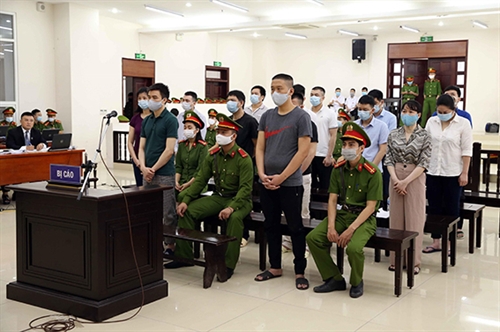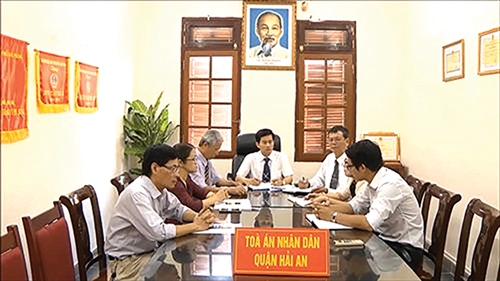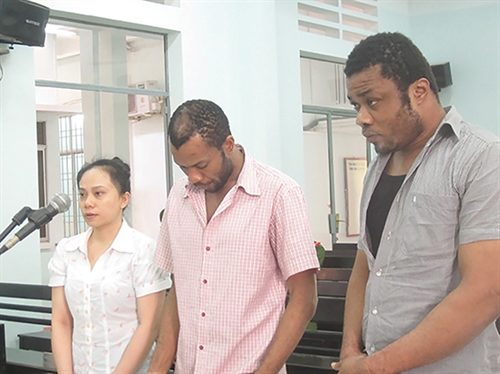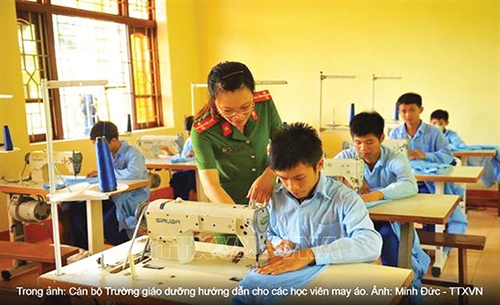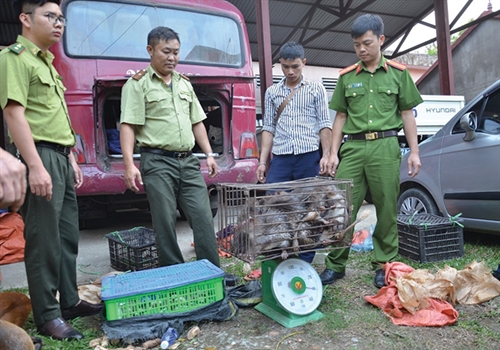This article highlights new provisions of the 2015 Penal Code and the 2019 Law on Execution of Criminal Judgments[1] regarding the two judicial remedies of compulsory medical treatment and education at reformatories applied to juvenile offenders in Vietnam.
Vu Hai Anh[2], LL.D.
Hanoi Law University
Together with penalties, judicial remedies reflect the Vietnamese State’s criminal justice policy. Functioning to support or substitute for penalties[3], they are applied to offenders who need to be comprehensively handled for their socially dangerous acts and aimed at doing away crime commission conditions and protecting social order and security. For offenders who are mentally ill and unable to cognize or control their acts, these remedies help restrict their socially dangerous acts in a humanitarian way.
Under the 2015 Penal Code, revised in 2017, (the current Penal Code), judicial remedies include: confiscation of objects and money directly related to crime commission; return of property, redress of or payment of compensation for damage; forcible public apology; compulsory medical treatment; and education at reformatories[4].
Compared to the 1999 Penal Code (revised in 2009), the current Penal Code no longer provides education in communes, wards or townships as a generally applicable remedy but redefines it as one of measures for supervising and educating under-18 offenders who are exempt from penal liability[5]. This change marks a progress in Vietnamese lawmakers’ view about the nature and severity of the remedy of education in communes, wards or townships which aims only at compelling juvenile offenders to show their repentance in their normal living environment but not at punitively separating them from the community. In practice, this remedy is executed under the supervision by local People’s Committees and social organizations, not by public security offices or judgment execution bodies. No longer specifying this remedy in the current Penal Code as a judicial remedy is suitable to its own purpose and the practical development of the criminal law.
The execution of each of the aforesaid judicial remedies is subject to different procedures and methods provided in different legal documents. Of these judicial remedies, the current law on execution of criminal judgments provides procedures for the execution of only two remedies, namely compulsory medical treatment and education at reformatories. The others are specifically stipulated by the Law on Execution of Civil Judgments or may be executed at court hearings for criminal cases. For this reason, this article analyzes only new provisions of the 2019 Law on Execution of Criminal Judgments (the 2019 Law) on the execution of these two judicial remedies.
 |
| Students at Ninh Binh province-based Reformatory School No. 2 learn traditional crafts__Photo: Minh Duc/VNA |
Compulsory medical treatment
Compulsory medical treatment is a coercive remedy aimed at treating, caring for and rehabilitating the health of offenders suffering from mental illness or other diseases that deprive them of their cognitive ability or behavioral control ability. After recovery, if having no reasons for being exonerated from serving their sentences, offenders subject to this remedy must continue to be examined for penal liability or to serve their imprisonment sentences. Therefore, the execution of this remedy must adhere to the principles of ensuring medical treatment, care for and rehabilitation of health for offenders and preventing them from relapsing into committing socially dangerous acts.
When it is found unnecessary to send offenders subject to this remedy to a specialized health establishment, they may be returned to their families or lawful guardians for care under the supervision by competent state agencies.
Article 49 of the current Penal Code stipulates:
“1. For a person who commits a socially dangerous act while suffering a disease specified in Article 21 of this Code, the procuracy or the court may, based on the forensic examination or forensic psychiatry conclusion, decide to send him/her to a specialized health establishment for medical treatment.
2. For a person who commits an offense while having penal liability capacity but, before being sentenced, suffers an illness that deprives him/her of his/her cognitive ability or behavioral control ability, the court may, based on the forensic examination or forensic psychiatry conclusion, decide to send him/her to a specialized health establishment for medical treatment. After having recovered from the illness, this person may have to bear penal liability.
3. For a person who suffers an illness that deprives him/her of his/her cognitive ability or behavioral control ability while serving his/her imprisonment sentence, the court may, based on the forensic examination or forensic psychiatry conclusion, decide to send him/her to a specialized health establishment for medical treatment…”.
As per the above provisions, compulsory medical treatment may be applied in any proceeding stage of investigation, prosecution or trial.
In general practice, there are three kinds of person to whom this remedy may be applied: (i) a person who has committed a socially dangerous act while suffering a mental illness or another disease that deprives him/her of cognitive ability or behavioral control ability; (ii) a person who has committed a crime while having criminal liability capacity but suffers an illness that deprives him/her of cognitive ability or behavioral control ability before being sentenced; and (iii) a person who suffers an illness that deprives him/her of cognitive ability or behavioral control ability while serving an imprisonment sentence.
The execution of this remedy is also specifically provided in the current Penal Code as an action by a competent body or person defined in the Code to order a person who commits a socially dangerous act or is serving a sentence while suffering a mental illness or another disease that deprives him/her of cognitive ability or behavioral control ability to receive medical treatment at a health establishment designated under a court ruling or a procuracy’s decision[6].
Compared to the 2010 Law on Execution of Criminal Judgments (the 2010 Law), the 2019 Law’s provisions on execution of compulsory medical treatment have the following new details.
Firstly, fewer establishments may receive persons subject to compulsory medical treatment after this remedy is terminated.
As soon as a person subject to compulsory medical treatment recovers, the court or procuracy that has ruled or decided on execution of this remedy may base itself on the conclusion of the medical examination council to issue a ruling or decision on termination of this remedy and send it to the body that has requested the execution of this remedy for notification to the health establishment providing the mental illness treatment and to relatives of the person concerned.
Under the 2010 Law, the body that requested execution of this remedy had to receive back the person after his/her compulsory medical treatment is completed under a court ruling. In case the compulsory medical treatment is terminated under a procuracy’s decision, relatives of such person had to receive him/her back[7]. The 2019 Law requires the body that has requested execution of the remedy to receive back the person, regardless of whether the execution of this remedy is terminated under a court ruling or a procuracy’s decision.
Secondly, some terms are changed to better suit specialized laws and the practical execution of this remedy. For example, “mental hospital” under the 2010 Law is replaced by a more general term of “establishment providing mental illness treatment”[8]. The phrase “conclusions of examination councils” under the 2010 Law is replaced by a more specific phrase “conclusions of forensic psychiatry councils” to be consistent with the 2012 Law on Judicial Expertise.
Education at reformatories
Education at reformatories is the only judicial remedy applicable to juvenile (under-18) offenders if it is deemed necessary to keep them under a strict discipline at educational institutions given the severity of their criminal acts, their personal records, and their living environment in order to educate and reform them. With this remedy, juvenile offenders are placed under strict management and isolated from the community but still provided with general education, vocational education and job training as well as access to cultural, art and entertainment activities. In other words, they are not detained like those serving imprisonment sentences.
The current Penal Code stipulates this remedy in Article 96 as follows:
“1. The court may apply the remedy of education at reformatories for a period of between 1 year and 2 years to criminal offenders aged under 18 years if deeming it necessary to send these persons to educational institutions with strict discipline due to the severity of their criminal offenses, their personal records and their living environment.
2. Persons who are sent to reformatories for education shall fully perform their study, job learning and labor obligations under the management and education of such reformatories.”
As per these provisions, this remedy may be applied to a juvenile offender when the court finds that his current living environment is unfavorable for his education, or when his parent(s) or sibling(s) has/have previous criminal convictions or regularly commit(s) violations, or his friends have bad personal records and insert negative impacts on his lifestyle, or he has no stable learning, working or residence place, which would lead him into an unhealthy lifestyle.
The 2019 Law defines execution of this remedy as consignment by competent bodies or persons as defined in this Law of minors (juvenile offenders) to reformatories for education under legally effective court judgments or rulings[9]. Compared to the 2010 Law, the 2019 Law’s provisions on execution of education at reformatories have several new features.
Regarding procedures for execution of this remedy, the 2019 Law adds two new provisions. First, within three working days after making a judgment or ruling on application of the remedy, the court will send it to the person concerned, the district-level public security division’s judgment execution office of the locality where he/she resides, and his/her representative[10]. Second, upon receiving a person subject to the remedy, the reformatory’s director must check his/her file, make a handover and receipt minutes, have him/her get a health check[11], and notify his/her representative of the receipt within five working days from the date of receipt.
The 2019 Law adds new provisions on dossiers of request for postponement of the execution of this remedy[12] and requires the court that has made the ruling on the postponement to send it, within three working days after issuing it, to the representative of the person subject to this remedy, in addition to the district-level public security division’s judgment execution office, same-level procuracy and the person eligible for postponement as specified in the 2010 Law[13].
It also provides for the first time suspension of the execution of this remedy. Accordingly, in case a reformatory student falls seriously ill, the reformatory director will make a dossier and request in writing the district-level court of the locality where the reformatory is located to consider and rule on suspending the execution of this remedy. Such ruling must be sent, within three working days after it is issued, to the court that has ruled on execution of this remedy, in addition to the district-level public security division’s judgment execution office, same-level procuracy and the person eligible for suspension of this remedy as required in the 2010 Law.
Regarding execution of orders on transfer of reformatory students, the 2019 Law adds two new provisions on the competence to issue the orders[14] and exceptional cases where transferred students are sent home for medical treatment in which their travel and accommodation expenses are paid by their families[15].
Finally, regarding learning and labor activities, meals and accommodations for reformatory students, the 2019 Law adds provisions on daily time for learning and labor activities and use of labor fruits of reformatory students[16]; meals compared to standard food rations for reformatory students on public and New-Year holidays[17]; and their daily accommodations[18].-
[1] The 2019 Law on Execution of Criminal Judgments was passed by the 14th National Assembly of the Socialist Republic of Vietnam on June 14, 2019, at its 7th session, and promulgated under the President’s Order dated June 28, 2019, and took effect on January 1, 2020.[2] Email: haianh@hlu.edu.vn.[3] The 2015 Penal Code provides judicial remedies applicable to both individual offenders and corporate offenders. However, this article discusses only two judicial remedies applicable to individual offenders, namely compulsory medical treatment and education at reformatories.[4] Articles 46.1 and 96 of the current Penal Code.[5] Article 95 of the current Penal Code.[6] Article 3.14 of the 2019 Law. In this Law, the execution of the judicial remedy of compulsory medical treatment is provided in five articles (Articles 136 thru 140) in Section 2, Chapter X.[7] Article 119.3 of the 2010 Law.[8] At present, establishments designated to provide mental illness treatment include: the Central Institute of Forensic Psychiatry and Central Mental Hospital 1, which are responsible for receiving, managing and treating persons subject to compulsory medical treatment in the northern provinces and centrally run cities; the Da Nang Mental Hospital, responsible for receiving, managing and treating persons from the provinces and centrally run cities in Central Vietnam and the Central Highlands; and the Southern Division of the Central Institute of Forensic Psychiatry and Central Mental Hospital 2, responsible for receiving, managing and treating persons from the southern provinces and centrally run cities.[9] Article 3.15 the 2019 Law. In this Law, the execution of the judicial remedy of education at reformatories is provided in seventeen articles (Articles 141 thru 157) in Section 3, Chapter X.[10] Article 124.1 of the 2010 Law and Article 141.1 of the 2019 Law. A juvenile offender’s representative should receive all court judgments and rulings against him/her in order to guarantee his/her rights and interests in the course of execution of the remedies.[11] The new provision on giving health-checks to those admitted into a reformatory helps certify their physical conditions for them to participate in learning and labor activities at the reformatory and facilitates making of their comprehensive personal files for monitoring their physical improvements during their reformatory periods.[12] Under Article 142.2 of the 2019 Law, such a dossier must comprise a written request of the person subject to the remedy or his/her representative; conclusions of a district-level or higher-level medical establishment on illness state of the persons subject to the remedy; and a surety by the representative of the person subject to the remedy as certified by the local administration.[13] Article 125.2 of the 2010 Law on Execution of Criminal Judgments and Article 142.5 of the 2019 Law.[14] Under the 2019 Law on Execution of Criminal Judgments, the Ministry of Public Security’s Criminal Judgment Execution Management Agency may issue orders on transfer of reformatory students instead of its head as provided in the 2010 Law.[15] Article 145 of the 2019 Law on Execution of Criminal Judgments.[16] Under Article 146.2 of the 2019 Law on Execution of Criminal Judgments, the working period of reformatory students must not be longer than the learning period, which must not exceed seven hours a day; and labor fruits of students will be used for their daily-life and learning activities and contributed to the community integration fund and reward fund for them.[17] Under Article 149.1 of the 2019 Law on Execution of Criminal Judgments, on public holidays specified by law, reformatory students are entitled to additional meals which must not exceed five times the standard food ration for ordinary days.[18] Under Article 150.2 of the 2019 Law on Execution of Criminal Judgments, reformatory students may be provided with beds or floors with sedge mats and may use their personal articles, except those banned from use in reformatories.
